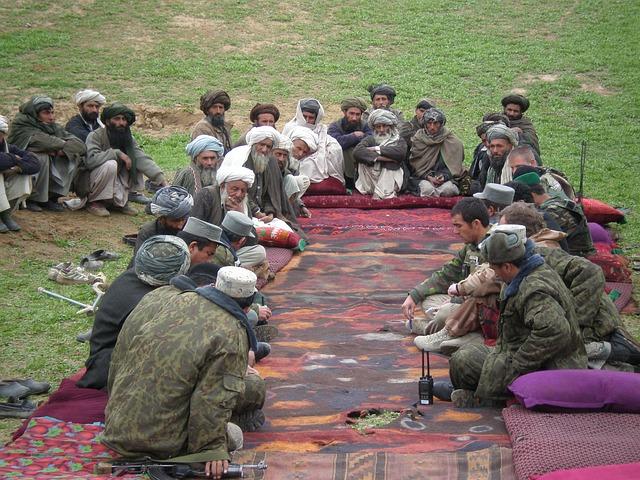Pashtun nationalism and the American withdrawal from Afghanistan
Posted By Mohammed Ayoob on January 21, 2019 @ 13:30

Reports [1] from Washington suggest that US President Donald Trump is pushing for a quick military withdrawal from Afghanistan and that the defence establishment is attempting to reduce the number of troops pulled out and the speed of the withdrawal. However, given Trump’s maverick decision-making style, a US departure is likely to happen sooner rather than later.
It’s imperative that any analysis of the future of Afghanistan factor in the variable of Pashtun nationalism now primarily represented, even if in distorted fashion, by a resurgent Taliban. What has given the Taliban’s appeal potency is their ability to couch in religious terminology traditional Pashtun aspirations for dominance in Afghanistan and the tribes’ aversion to foreign interference.
Most Pashtuns, who comprise more than 40% of Afghanistan’s population, believe that they are the rightful rulers of the country because Pashtun dynasties have dominated Afghanistan for most of the last 300 years. The traditional equation among Afghanistan’s ethnic groups was radically altered first by the Soviet invasion of 1979 and then by American assault in 2001, which was aided by the largely Tajik Northern Alliance that became the de facto ruler of the country in the initial period after the invasion.
The immediate causes for the advent of the Taliban were a reaction to the fear of Tajik domination and the anarchy produced by the ‘mujahidin’ factions fighting each other after the Soviet withdrawal in 1989. The Taliban imposed a degree of order and ruled approximately three-quarters of Afghanistan from 1996 to 2001.
Pashtun resentment against foreign intervention has a long history dating back to the British intrusion during the 19th century. Opposition to the Durand Line, crafted by the British to divide Pashtun lands, was the principal reason Afghanistan cast the lone vote against Pakistan’s admission to the United Nations in 1947.
Traditionally, Pashtun nationalism in Afghanistan was based on tribal loyalties and the commitment to Pashtunwali, the tribal code of ethics. It was not driven primarily by religious beliefs. This explains Afghanistan’s antagonism towards Pakistan in the three decades after it became independent, despite the fact that it was also a Muslim country.
The Soviet invasion of Afghanistan in December 1979 fundamentally changed the nature of both Pashtun nationalism and Afghanistan’s relationship with Pakistan. It led to American and Saudi support for the Afghan insurgency, with Pakistan acting as the conduit for American arms and Saudi financial support to the tribes fighting the Soviets. It also led to the importation of Wahhabi ideology through madrasas set up with Saudi funding for refugee children on the Pakistan–Afghanistan border. The Taliban (literally, ‘students’ in Persian) were products of these schools.
Simultaneously, the Soviet invasion altered the nature of Pakistan’s relationship with Pashtun nationalism, turning it from hostility to support and sustenance. Pakistan’s support for the tribal insurgency made the Pashtun tribes dependent on Pakistani goodwill and also changed Pakistan’s image among Pashtuns from potential enemy to reliable friend. Pakistan saw the mayhem in Afghanistan following the Soviet withdrawal as a great strategic opportunity and extended military and political aid to the Pashtun Taliban, helping to install them in power in 1996.
The Taliban regime provided Pakistan with defence in depth in the event of a conflict with India. It also offered Pakistan the opportunity to use Afghan territory to train terrorist organisations that were used against India in Kashmir. Equally important, Pakistan’s support to this religiously inspired manifestation of Pashtun nationalism largely solved the problem of Pashtun irredentism within Pakistan by portraying the country as the natural ally of Pashtun political ambitions.
Although Pakistan ostensibly changed course under American pressure in 2001, it provided clandestine support to Taliban factions within Afghanistan that were fighting American and allied forces. It also gave refuge to the Taliban leadership in the city of Quetta in Baluchistan. Despite Washington’s anger at Islamabad’s duplicity, this strategy paid Pakistan dividends that are likely to increase with the anticipated American withdrawal.
The divided nature of the Kabul regime and its corruption and inefficiency have helped the Taliban gain renewed support among parts of the Pashtun population. The resurgent Taliban are driven only partly by religion. They are motivated equally, if not more, by the search for Pashtun dignity and revenge. While they’re not in a position to rule over the entire country, they control large swathes of the rural areas in the predominantly Pashtun provinces of eastern and south-eastern Afghanistan. That means they’re in a position to continue the civil war indefinitely, especially because their control of the drug trade allows them to finance their military activities and helps them buy acquiescence, if not active support. The withdrawal of American forces will provide the Taliban with greater opportunity to expand their area of operations and will give them more clout within the fractured Afghan polity.
Therefore, it is important that the Taliban be included in any future dispensation in Afghanistan. The Trump administration is cognisant of this fact. Washington has reached this conclusion on the basis of the Taliban’s demonstrated ability to disrupt any political order that doesn’t satisfy at least some of its goals.
The US president’s special envoy for Afghan peace, Zalmay Khalilzad, has met with representatives of the Taliban in Qatar twice in recent months to find a way out of the impasse. However, the US administration has to go beyond merely recognising the disruptive capacity of the Taliban and realise that they genuinely express the political aspirations of a substantial segment of the Pashtun population. Only then can a stable order be constructed in the war-torn country.
Article printed from The Strategist: https://aspistrategist.ru
URL to article: /pashtun-nationalism-and-the-american-withdrawal-from-afghanistan/
URLs in this post:
[1] Reports: https://www.washingtonpost.com/world/national-security/new-plans-for-afghanistan-would-have-trump-withdrawing-fewer-troops/2019/01/08/ddf2858e-12a0-11e9-a896-f104373c7ffd_story.html?utm_term=.9bd14f2ceee7
Click here to print.